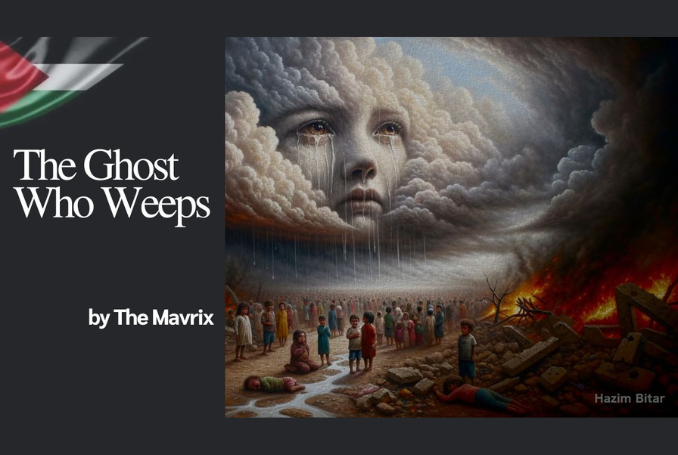
By The Mavrix
South African music band, The Mavrix, in partnership with African Artists Against Apartheid, has recently released a song and video called ‘The Ghost who Weeps’ in solidarity with Occupied Palestine and the genocide in Gaza.
The song was inspired by the poetry of two close comrades in Al-Khalil (Hebron and Gaza who both lost close family and friends in the massacres by apartheid Israel in 2023 in an unashamed ethnic cleansing and mass genocide of Palestinian civil society.
Despite the genocidal onslaught, Palestinians have shown incredible resilience in resistance to justice and freedom. Almost like the symbolic Handala turning his back from the world feeling alone but steadfast in their collective resistance to apartheid atrocities as the world watches in silence.
But Palestinians are not alone.
This song is a show of solidarity from South African musicians and the broader African Artists Against Apartheid movement. It is based on an old South African melody named “Shireen’s Theme” by an unknown composer which was well known by musicians in the South African apartheid 70s and 80s.
The video was produced and directed by the very creative Yusrah Bardien, a very passionate activist for social justice and a member of African Artists Against Apartheid along with Jeremy Karodia from The Mavrix.
Because of this well-known South African melody, the video created by Yusrah Bardien, the poetry of our Palestinian comrades and the music of The Mavrix, this song is a true collaboration of solidarity between South Africa and Palestine.
“The Ghost who Weeps” was released last Wednesday 29 November 2023 to mark the International Day of Solidarity with Palestine. ????
The Ghost who Weeps
by The Mavrix
Lyrics: Badee Dwaik, Haidar Eid, Jeremy Karodia.
Intro music: “Shireen’s Theme” unknown composer (South African)
Music composed and arranged by Jeremy Karodia.
Video directed by Yusrah Bardien
Visuals courtesy Hazim Bitar

– The Mavrix is a South Africa-based music band. As artists growing up in apartheid South Africa, The Mavrix felt it necessary to keep the momentum of writing new social justice music underlining the current socio-political injustices around the world.







